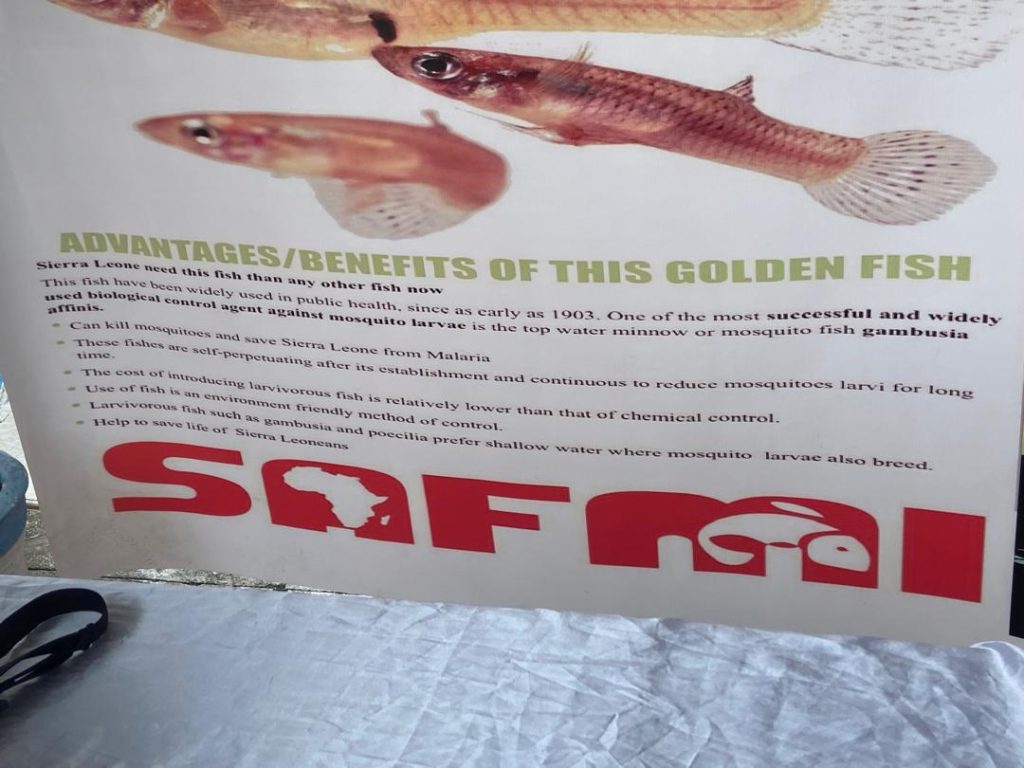By Alhaji Haruna Sani

In an innovative effort to combat malaria in Sierra Leone, Save Africa from Malaria Infection (SAFMI) officially launched a project on Thursday, November 12, leveraging the natural mosquito-eating behavior of Gambusia fish to help curb the spread of malaria.
The launch, held at A2-1, West African Sunshine on Lumley Beach Road, Aberdeen, attracted stakeholders, government representatives, and health advocates to discuss the innovative and sustainable approach.
SAFMI founder Yury Aguilera welcomed attendees, explaining that Gambusia fish were chosen for this initiative due to their high efficiency in reducing mosquito populations.
Artem Volchenko, SAFMI’s CEO in Sierra Leone, explained that Gambusia fish, known for their ability to consume up to 300 mosquito larvae per day, thrive in diverse water conditions, making them a low-maintenance and environmentally friendly solution to malaria.
“Unlike chemical treatments, which can harm ecosystems and have limited reach, Gambusia fish provide a natural and sustainable way to reduce malaria transmission,” Volchenko said. “This aligns with SAFMI’s commitment to eco-friendly innovation in combating malaria.”
Deputy Minister of Planning and Economic Development, Rev. Dr. Titus Williams, delivered the keynote address on behalf of the Ministry of Planning. Dr. Williams praised SAFMI’s approach as a significant addition to the government’s Medium-term Development Agenda, which includes the goal of eradicating malaria by 2030.
He emphasized the government’s dedication to improving public health as a core part of its Human Capital Development initiative, expressing strong support for SAFMI’s malaria control efforts.
“Malaria remains one of the most pressing health issues in our country. Through projects like SAFMI’s Gambusia fish initiative, we see the potential to bring about lasting change,” Dr. Williams said. “The government is fully committed to backing innovative, sustainable projects that support our mission to end malaria and improve the quality of life for our citizens.”
Alice Neneh James, National Coordinator of the Sierra Leone Association of Non-Governmental Organizations (SLANGO), welcomed SAFMI’s membership and expressed support for the initiative.
She highlighted the profound impact of malaria on Sierra Leonean families, emphasizing that the disease affects nearly every citizen and has claimed millions of lives across Africa.
She noted that African leaders have pledged to end malaria by 2030, a commitment echoed in the United Nations Sustainable Development Goals (SDGs) and SAFMI’s ambitious aims.
Dr. Prisca Ndu, SAFMI’s representative from Nigeria, pointed out the negative effects of past chemical-based malaria treatments, noting their harmful health consequences, including reduced life expectancy.
She praised SAFMI’s commitment to an environmentally friendly approach to combating malaria without the use of chemicals, which could have long-term health benefits for communities.
Dr. Kadijatu Grace Kamara, Sierra Leone’s Deputy Minister of Tourism, shared her enthusiasm for the initiative. “Sierra Leone needs this kind of fish now more than ever. Introducing larvivorous fish like Gambusia offers a cost-effective solution compared to chemical controls,” she said, applauding SAFMI’s team for their innovation.
SAFMI’s ambitious vision extends beyond Sierra Leone, aiming to expand its efforts across Africa by collaborating with governments and educational institutions to implement sustainable malaria control measures.
By promoting natural solutions, SAFMI envisions a healthier future where malaria is significantly diminished, and communities are empowered to sustain these solutions independently.
Through innovation, eco-friendly practices, and collaboration, SAFMI’s project is setting a path toward a world where malaria no longer threatens the health and well-being of millions.


